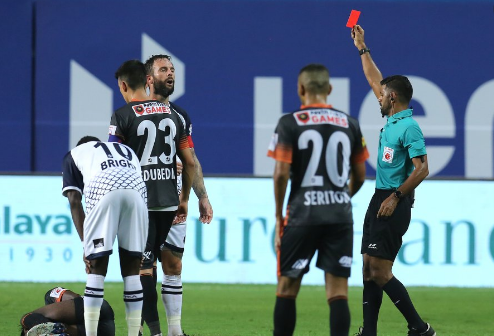A Superbly Indian League: Where Non Experts Hold Cards and Referees Get Sent Off

Referee Rowan Arumughan red cards Danny Fox of East Bengal for a rough challenge on FC Goa’s Alexander Romario Jesuraj during their Indian Super League match on January 6. Arumughan is a FIFA panel referee (Pic: ISL).
On January 6, at the Tilak Maidan in Goa, SC East Bengal defender Danny Fox was pulled up by the referee, Rowan Arumughan, for a challenge on FC Goa’s Alexander Romario Jesuraj. The FIFA referee, apparently, felt it was a foul vicious enough to call for marching orders and flashed the red card, much to the dismay of the East Bengal bench.
The incident, which transpired in the 56th minute of the Indian Super League (ISL) match, reduced the red and golden brigade to 10 men. However, not everybody who witnessed the incident agreed with the decision of the referee. The punishment was rather harsh, some felt. East Bengal officials were livid and filed an official protest.
What happened thereafter, and in the manner it happened, to put it bluntly, was far worse than Arumughan’s decision. In an unprecedented move, the All India Football Federation (AIFF), through its disciplinary committee, reversed the red card flag on Fox. Three days later, the 34-year-old Scottish defender was back on the Fatorda pitch wearing the captain’s armband to foil Sunil Chhetri’s Bengaluru FC. Never in the recent past, had an on-field referee’s decision had been overturned by an outside agency in a top-tier championship of Indian football.
Also Read | Australian Open Stifled by Covid-19 Cases Among Players: Report
More than a week has gone by, and, if insiders are to be believed, the incident has left a deep scar in the minds of India’s top referees. In private, several referees confessed that the return of Fox to the field, without having to sit out at least one match because of the red card, is basically an attack on their credibility and a no-confidence motion passed against their entire community.
A referee, who didn’t want to be named for obvious reasons, said, “True, the red card decision was perhaps punitive, it could have been otherwise. But who decided the reversal? The disciplinary committee of the AIFF, which doesn’t have a single member having any technical knowledge of the game. Now, the federation has given them the responsibility to evaluate on-field decisions.”
Headed by a reputed lawyer, the disciplinary committee consists of some highly respected names from different professions. None of them, however, are known to have played football or officiated in any technical role in the past. To allow them to judge the intensity of a foul is bizarre indeed!
The lack of technical knowledge did not deter the disciplinary committee from arriving at a decision. There was no indication from the AIFF that the bunch of wise men in the committee had taken any advice from anyone from the referring panel or community before reaching a conclusion.
The release from the federation said: “The Committee was convinced that Fox’s sending off after his sliding tackle on FC Goa’s Alexander Romario Jesuraj was ‘an error apparent on the part of the referee and calls for rectifying the same in the interests of fair play’ and necessitated overturning of the red card and the subsequent one match ban.”
The problem, like most things in Indian football, lies elsewhere. There is a clear feeling among India’s top tier referees that they were being treated shabbily. Ever since the start of the ISL season, the referees have been targeted for every mistake they committed, their errors have been magnified on a regular basis to project them as villains in an otherwise faultless show. The national body remained a mute spectator to the entire drama.
Also Read | Thrillers, Spillers and a Gokulam Kerala Fight Back Fit for Folklore
A former referee, who has been following the development closely, feels the current lot of referees have become a vulnerable lot while a section in Indian football is working overtime to undermine the very sanctity of football supervision in India.
He said: “The clubs try to keep the referees under pressure. That’s natural in competitive football. But when the authorities don’t back referees, then it turns into a serious problem. That’s what is happening here.
“If you notice, there are regular reports quoting sources in the ISL or the AIFF about how poor the performances of the referees are. There are suggestions that one or two of them would be sent home because they are either bad or far from convincing. One report has even gone to the extent of saying one top referee could stand suspended. I don’t blame the reports. I blame those who are in charge. Not one among them have come out to refute the charges and back the referees. Because they are out to please people in position. Do you think this will help to enhance the confidence of the referees?”
But, to reiterate, the problem is deeper and goes back longer than this season. To ask non-technical people to judge fouls and infringements is neo-normal in Indian football for sure. But the plight of referees is something that took years of apathy in the making.
No one raised an eyebrow when the much-publicised system of having professional referees in India was discontinued for nearly a year in 2018. At a time, the AIFF had around a dozen professional referees. Today, the number has come down to eight. The reason for this sudden downslide has not been answered yet, nor has the problems been addressed.
Also Read | At Home in the New Normal: How Footballers are Forged in Bubbles
It doesn’t end here. The AIFF is set to host the under-17 women’s World Cup and the 2022 women’s Asia Cup. The tournaments have been hailed as giant strides towards progress of women’s football in India. At the same time, the country’s only academy for women’s referees that the federation once opened in West Midnapore, West Bengal, has quietly and suddenly been discontinued officially, leaving around 20 aspiring women referees in the lurch.
Yellow cards and red cards are often withdrawn in places like England. There is nothing wrong in it. However, there one has the privilege of using the VAR system, which is too expensive for India’s domestic football structure. In that case, it is always better to allow the supervisors to have the final say in matters on the pitch.
The fact is a disturbing trend could be identified in Indian football for the past few seasons -- a clandestine effort to control (and undermine too) the system of Indian refereeing. It could prove dangerous and break the backbone of neutrality. No doubt, Indian referees have deficiencies. Perhaps too many. But referees are part of the system. It has to be as good or bad as the country’s football is. One has to accept this fact and continue with the show.
Get the latest reports & analysis with people's perspective on Protests, movements & deep analytical videos, discussions of the current affairs in your Telegram app. Subscribe to NewsClick's Telegram channel & get Real-Time updates on stories, as they get published on our website.
























